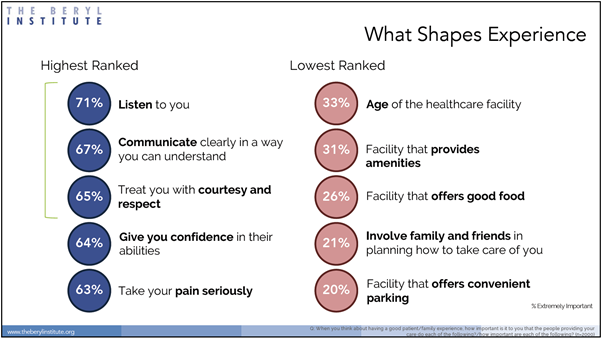
A few weeks ago I blogged about how I came to be invited to Chicago to speak at What Patients Say 2018, organised by Francis Fullam of Rush University Medical Center. It was a real pleasure to be there with my fellow Brit Jocelyn Cornwell, from the Point of Care Foundation.
The purpose of the conference was to explore a wide variety of perspectives on the value of hearing people’s experiences of their care. Discussions covered all kinds of feedback including online feedback, complaints (which in the US means informal concerns), grievances (which means formal complaints), doctor rating sites, and interactions with staff.
The central concern of many healthcare providers seemed to be “patient acquisition” and “patient retention”, with all human relationships ultimately seen through a business lens. And the commercial imperatives of US healthcare seemed to sit uncomfortably with the academic research presented in Chicago on how people make choices and interpret the experiences of others.
The medical profession is very ambivalent about all of this
There was a widely shared assumption that most online feedback should relate only to medical staff, who on many sites are rated in order to support “consumer choice”. As you might expect, the medical profession is very ambivalent about all of this, much as they also are in the UK and Australia.
Oddly, recognising that if consumers did actually choose according to ratings they might all choose the same doctor, one healthcare company encouraged patients to rate doctors but made sure the ratings didn’t actually appear when you searched for doctors on their website, so as to discourage the ratings from being used in making a choice.
Online patient feedback in the US isn’t widely seen as a source of service improvement opportunities, staff learning, educational value or new relational possibilities. But the Beryl Institute is providing national leadership and advocacy around using patient feedback to learn about and improve patient experience.
And despite the enormous differences between US and UK healthcare systems, what US patients care about doesn’t seem so very different from their UK counterparts:
Finally, there was much interest (as there is in the UK too) in the potential of machine learning to process, summarise and even quantify the stories that people tell about their care experiences. Such discussions always seem to come with a strong emphasis on how the algorithms work their magic, but much less thought about why this might be valuable. After all, if all we want is a set of numbers, why collect stories in the first place? Simple surveys would provide greater validity at lower cost.
Patient feedback about care is not going away
There is a risk here that, seduced by the shiny new world of big data analytics, we find ourselves suffering from "premature quantification" and forgetting about the power of stories to prompt change in hearts and minds.
Overall, the conference provided a terrific opportunity to compare and contrast the state of play in the UK and the US, and the debates happening on both sides of the pond. In all of this, it seems clear that patient feedback about care is not going away anytime soon.
To enrich the debates around purpose and values, at future conferences it would be valuable to hear directly from patients and carers about what they want from online feedback, both when they are sharing it as well as when they are reading it.
What Patients Say 2018
What Patients Say 2018 https://www.careopinion.org.uk/resources/blog-resources/1-images/aa63231a29d343149d9ec3ecf9a87843.png Care Opinion 0114 281 6256 https://www.careopinion.org.uk /content/uk/logos/co-header-logo-2020-default.pngUpdate from Care Opinion
Posted by James Munro, Director of Research & Development, Care Opinion, on
Thanks for your feedback.
Response from Francis Fullam on 26 Nov 2018 at 15:30
James - you connected to many themes from the conference and stated simply what the challenges are. Please keep blogging on these ideas. Francis Fullam, Rush University Medical Center

